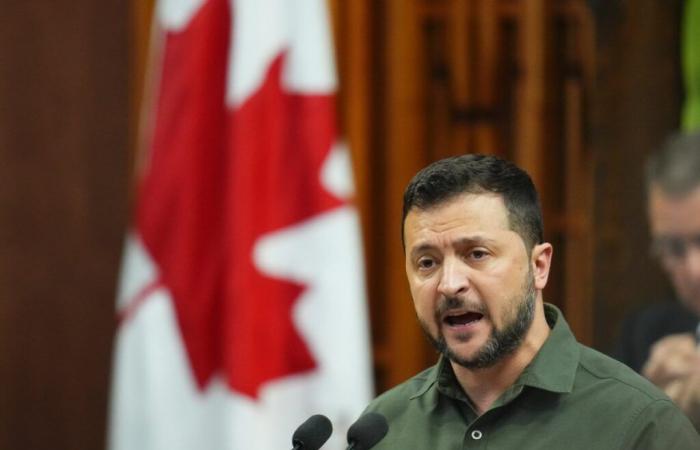OTTAWA — The upheavals within the Liberal Party of Canada and the return of Donald Trump to the White House have Canadians of Ukrainian origin hoping that Ottawa’s support for Ukraine will remain firm.
“We believe Canada is at its best when there is cross-party consensus on Ukraine,” said Ihor Michalchyshyn, director of the Ukrainian Canadian Congress.
At a meeting of the Ukraine Defense Contact Group Thursday in Germany, Canadian Defense Minister Bill Blair announced details of $440 million in funding pledged earlier this year to Ukraine .
But even as Canada and other NATO allies make medium-term commitments to Ukraine’s defense, some observers worry about the sustainability of that support.
Prime Minister Justin Trudeau announced Monday that he will step down as leader of the Liberal Party once his successor is chosen. This news comes just weeks after the resignation of his deputy prime minister and finance minister, Chrystia Freeland, the most prominent Ukrainian-Canadian in federal politics.
Both Mr. Trudeau and Ms. Freeland have made the defense of Ukraine a key part of Canada’s position on the international stage, particularly after Russia’s full-scale invasion of Ukraine, which will enter into his third year next month.
United States President-elect Donald Trump will take office on January 20. He both praised Russian President Vladimir Putin for taking control of Ukrainian territory and criticized Ukrainian President Volodymyr Zelensky and his country.
Mr. Trump said he would bring peace to the region from the start of his term. Some analysts suggest he intends to pressure Ukraine into ceding more territory to Russia.
Ihor Michalchyshyn said his organization will monitor this year’s Liberal leadership race and general election to ensure all parties continue to support Ukraine.
“We would be concerned if we saw candidates, political leaders or MPs, from any party, speaking out against this consensus and making statements to the contrary and pushing us in the direction of less support for Ukraine .
“I’m not terribly concerned that a Liberal leadership candidate or a member of another political party will change tactics.”
What will Poilievre do?
Mr. Michalchyshyn believes that Justin Trudeau has left a positive legacy in his government’s advocacy for Ukraine, despite delays in delivering promised equipment. Conservatives have pushed the government to send more weapons to Ukraine and support European efforts to wean the continent off Russian energy.
But former Alberta Progressive Conservative deputy premier Thomas Lukaszuk noted that Conservative Leader Pierre Poilievre rarely talks about Ukraine.
“I worry about Canada’s unwavering support for Ukraine, if (…) Poilievre becomes the next prime minister and Trump continues what he promised to do,” he said.
Mr. Lukaszuk points out that the federal Conservatives voted against routine spending bills that included federal support for Ukraine.
The Conservatives voted against a free trade deal with Ukraine in 2023 because it included a clause on carbon pricing. That prompted liberals to launch ads accusing conservatives of siding with U.S. Republicans who oppose support for Kyiv.
-While some Conservative MPs frequently talk about Ukraine, Marcin Gabrys, director of the department of Canadian studies at the Jagiellonian University in Krakow, noticed that Mr. Poilievre rarely spoke about this country. “It’s something that worries me.”
Mr. Poilievre’s office responded to a request for comment with a statement attributed to the party’s foreign affairs spokesperson, Michael Chong. In this statement, Mr. Chong criticizes the Liberals’ approach to Ukraine, but does not specify whether Mr. Poilievre was talking enough about this country.
“Common-sense conservatives stood firmly with the Ukrainian people in their fight against Putin’s illegal invasion and our unwavering support continues to this day,” the statement read.
Mr. Chong criticized the Liberals for allowing exemptions in their sanctions regime, such as the one that allowed Bombardier to import Russian titanium products.
At the end of 2022, at the request of the German government, Ottawa granted an exemption from sanctions which allowed a Montreal company to repair the turbines of a gas pipeline operated by the Russian public energy giant Gazprom.
“We will continue to hold the Liberals accountable for their blatant misinformation and pathetic attempts to distract and divide Canadians on this issue,” read Mr. Chong’s statement.
Canadian support weakens
Canadians of Ukrainian origin represent approximately 3.5% of Canada’s population, but more than 10% of the population of the three Prairie provinces.
Former Alberta MP Lukaszuk says the Conservatives’ political dominance in that region means they are unlikely to face significant repercussions at the polls from changes in Canada’s support for Ukraine.
The Angus Reid Institute released a poll early last year suggesting that overall support for Ukraine had declined in Canada. One in four Canadians declared in February 2024 that Canada was “doing too much” to help Ukraine, compared to 9% in May 2022.
This opinion was more common among conservative voters, increasing from 19% in May 2022 to 43% last February.
According to Professor Gabrys, the Trudeau government can certainly be criticized for delays in military aid and for not having met NATO’s spending target. But he believes Mr Trudeau helped Ukraine by ensuring it was a topic of conversation at any world summit he attended. “When the United States changes its approach, Canada is needed,” he said.
Garry Keller, vice-president of the lobbying firm StrategyCorp and who served as chief of staff to former Conservative Foreign Minister John Baird, believes Pierre Poilievre remains focused on the “local and existential issues” that tend to be fundamental issues during elections — such as housing and the cost of living — rather than foreign policy.
The situation in Ukraine could change dramatically with Mr. Trump coming to power, making it less useful for a Canadian politician to make comments just before an election campaign, Mr. Keller said.
“No matter our level of support for Ukraine (…) Canada will be no match” for the posture of the United States, he added.






